10 Factors Helping Me in My Journey as a Mother of an Autistic Son

Autism is a neurobiological developmental disorder that typically appears before the age of 3 years. Autism affects the brain in the areas of social interaction, communication and cognitive function. In the United States 1 out of every 68 children is diagnosed with Autism and boys are four times more likely to have autism than girls. Autism does not have any specific racial or socioeconomic prevalence.
According to the National Autism Association, about 40% of children with autism do not speak; about 25-30% of children with autism have some words at 12-18 months of age and then lose them. Others might speak, but not until later in childhood. Autism greatly varies from person to person, so no two individuals with autism are alike.
My son, Ikedi, was first diagnosed at age 4 (the average age of diagnosis is 4 years and 5 months). The major signs for him were speech and language delay (both expressive and receptive language). Ikedi was a very happy and very easy baby—he always smiled, he was easy to feed (exclusive breast milk for the first 6 months) and he slept well. As he grew older, it became clearer that speech and communication were problem areas. For example, he did not wave good bye at the appropriate age, he did not say mama/dada or mommy/daddy until almost age 2 years, and he did not use simple words like milk until about age 2 years— he would point to what he wanted or just go get it himself. He was a very social child and was definitely interested in interacting with others. He was not able to easily interact with peers due to his significant delay in speech and language; pretend play was essentially impossible for him and he would play with toys (specifically cars and blocks only) in the same way every time. Also, he flapped (still flaps) his hands (only when he is excited though). Ikedi learned the alphabets and numbers quite early (by age 2-2.5 years) and he started reading certain words by age 3 years. He started receiving speech and occupational therapy in Preschool and privately at age 3. He was eventually formally assessed by a Developmental Pediatrician at age 4 years and she gave him the official diagnosis of Autism Spectrum Disorder (social communication Level 2, restricted patterns of behavior Level 1).
Ikedi started Kindergarten this Fall in a fully integrated classroom and he goes to school by regular school bus. He receives speech/language and occupational therapy twice a week at school (once a week privately) and he also receives 8 hours per week of ABA (Applied Behavioral Analysis) Therapy at home. Ikedi is thriving—he is a happy boy, he is attuned to the emotions of others (which is not a typical strength of autistic people); also, his speech and communication skills have grown leaps and bounds, though he is still delayed when compared to his peers. He loves to read (he is already reading at a first grade level) and he loves to sing. He is still quite shy; however, his ability to interact with peers and adults continues to improve.
So here are 10 Factors that have allowed me keep my center, thus far, and enabled me to help my son on this journey of unlocking his full potential:
- Facing Reality: I did not ignore signs of speech delay or try to rationalize away the social communication challenges my son faced/faces. We got him assessed via early intervention at age 18 months, by the school system at age 33 months and then by a Developmental Pediatrician at age 4 years as it became clearer that we were dealing with something greater than sole speech and language delay. The diagnosis can be tough to swallow—but it will eventually help you assemble the necessary tools/support for your child because the formal diagnosis will help your child qualify for certain resources within your school system, your state and local government programs and your health insurance plan.
- Learning about Autism (from a Parenting Perspective): I already had some academic knowledge about what Autism is given my experiences during my training in Pediatrics; also, I care for many autistic children in the operating room and in the ICU as a Pediatric Anesthesiologist and Pediatric Critical Care doctor. However, parenting an autistic child is a whole different matter. I sought out and continue to seek out experts: Developmental Pediatricians/Specialists, Special Education teachers, Speech and Language Therapists, Mental Health Professionals, Board Certified Behavior Analysts, and other Parents with older autistic children.
I do a lot of reading of books about Autism. Good start: The Autism Sourcebook: Everything You Need to Know About Diagnosis, Treatment, Coping, and Healing—from a Mother Whose Child Recovered (by Karen Siff Exkorn) and A Parent’s Guide to High-Functioning Autism Spectrum Disorder, 2nd Edition: How to Meet the Challenges and Help Your Child Thrive by Sally Ozonoff PhD, Geraldine Dawson PhD and James C Mc. Partland PhD). To order from Amazon click here and here. 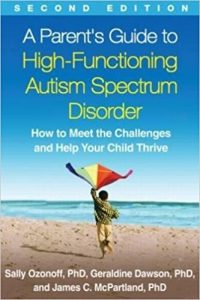
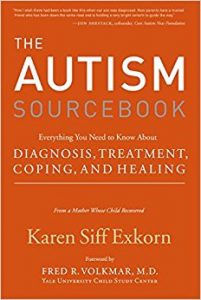
I also seek out on-line resources of organizations like: Autism Speaks (Autism Speaks is dedicated to promoting solutions, across the spectrum and throughout the lifespan, for the needs of individuals with autism and their families through advocacy and support; increasing understanding and acceptance of people with autism spectrum disorder; and advancing research into causes and better interventions for autism spectrum disorder and related conditions), the National Institute of Child Health and Human Development (NIH), and Northeast Arc which aims to help people with disabilities become full participants in the community and choose for themselves how to live, learn, work, socialize and play.
3. Advocating for my Child: I have amassed great skills in seeking out and applying for support services for my child either through our local School System or through Private Specialists (covered by our health insurance). For those who do not have health insurance or have gaps in coverage, your child’s diagnosis of Autism will likely qualify him or her for certain support services from the State in which you live. Click here to access an excellent guide (created by Autism Speaks) to understanding the IEP (Individualized Education Program) process, Early Interventions services, your child’s legal rights, and how to get services started for your child.
4. Befriending my Child’s Teachers and Therapists: I learned early to get to know my son’s teachers, assistant teachers, school therapists, school administrative staff, school bus drivers, ABA therapists, etc. I consistently and sincerely appreciate their hard work and expertise, showering them with praise that is much-deserved. I see them as extensions of me and my husband, as they will have the ability to greatly impact our child’s trajectory. By getting to know them, they get to understand our family’s priorities and incorporate them in their plans. A lot of these relationships will be long-term and quite meaningful as they are helping us with such a deeply personal journey.
5. Realizing that Autism is just one aspect of who my child is: My son is not hopeless or a pity case—he has so many strengths that far outweigh his challenges. Understand that Autism is not a disease that needs to be cured—his brain is just developing differently than the neurotypical kid. The way he interacts with the world is different—while this may present its own challenges, I don’t see my role as trying to make him a “normal kid.” I see my role more as helping my child harness his strengths and overcome his weaknesses as he navigates the world of social interactions in a way that allows him to unlock his full potential. 
6. Role-Modeling good behavior and proper social communication skills: Autistic children tend to be visual learners. My son learns best by visual cues, repetition and modeling target behaviors. We (adults in the home) do exactly the same things we expect of him (we sit down at the table to eat meals, we clean up and put things away in their proper storage places, sit and listen at church , use technology/digital media appropriately and we use polite words and treat others courteously). Children, generally, are much better at doing what we do, than doing what we say. Autistic kids are no different in this regard. 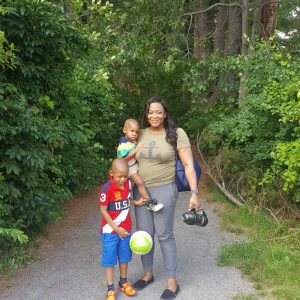
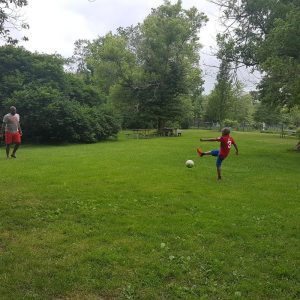
7. Having Fun with my kids: We have fun in our household because we understand that children learn best through play. We read books, we go to the library and to Book Stores, we sing silly songs and not so silly songs, we color, we scribble and doodle, we build Lego scenes, we take walks, we climb play structures, we take bubble baths, we watch movies, we go on family trips, we go swimming, we tickle and we laugh out loudly, we capture memories in scrapbooks, we do chores together and we embrace life fully with all its challenges. We count our blessings and do our best to carpe diem, refusing to get overwhelmed by things that are not in our control. 
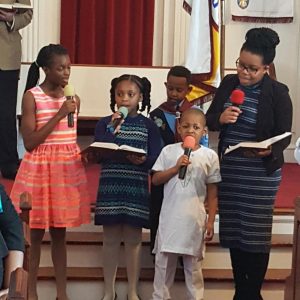
Ikedi singing in our Church’s Kids’ Choir
8. Challenging my autistic son: As Ikedi amasses skills and progresses through developmental stages, we continue to push him past his comfort zones. We praise his successes and reward his good behaviors, but, we also call out bad behavior and redirect him with firmness tempered by love. Once again, the best way to teach him is to show him and consistently role-model good behavior. We encourage him to make eye contact, to greet people politely, to face fears (we put him in the Church’s kids choir for example), and to make new friends. 
9. Taking care of myself: I have found that when I am living my most balanced life, i.e. working hard (achieving career goals, working out consistently, caring for my family by organizing our social life and home-making, and taking care of my many personal responsibilities) and playing hard (spending quality time with my husband sans kids, playing with my kids, pampering myself with spa treatments, brunch/dinners out with friends, and mini-vacations, enjoying my hobbies like fashion, music, travel, taking part in church activities and expressing my creative side via this blog), I feel the most empowered to take on the challenge of autism. It’s like in the airplane when flight attendants instruct you to put your own mask on first before helping your dependent(s). It makes perfect sense because if you pass out from lack of oxygen, then how can you help your dependent any further? So taking care of me is paramount if I am to be the best mother to my boys. 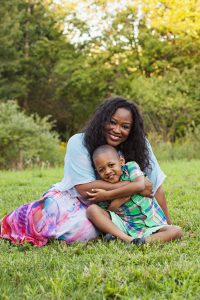
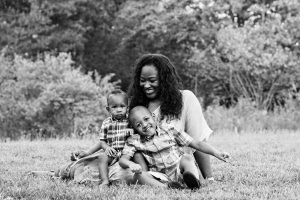
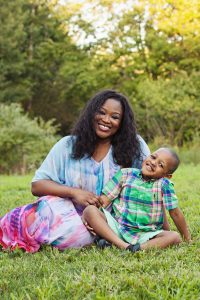
10. Understanding that Ikedi is a child of God: I am a firm believer that God created Ikedi in His own image, and so He will provide the resources and strength we need to raise Ikedi in a way that will please Him. We will do our honest bit as his parents and family; however, we have faith that God has a great plan for Ikedi and is writing a wonderful story for him.
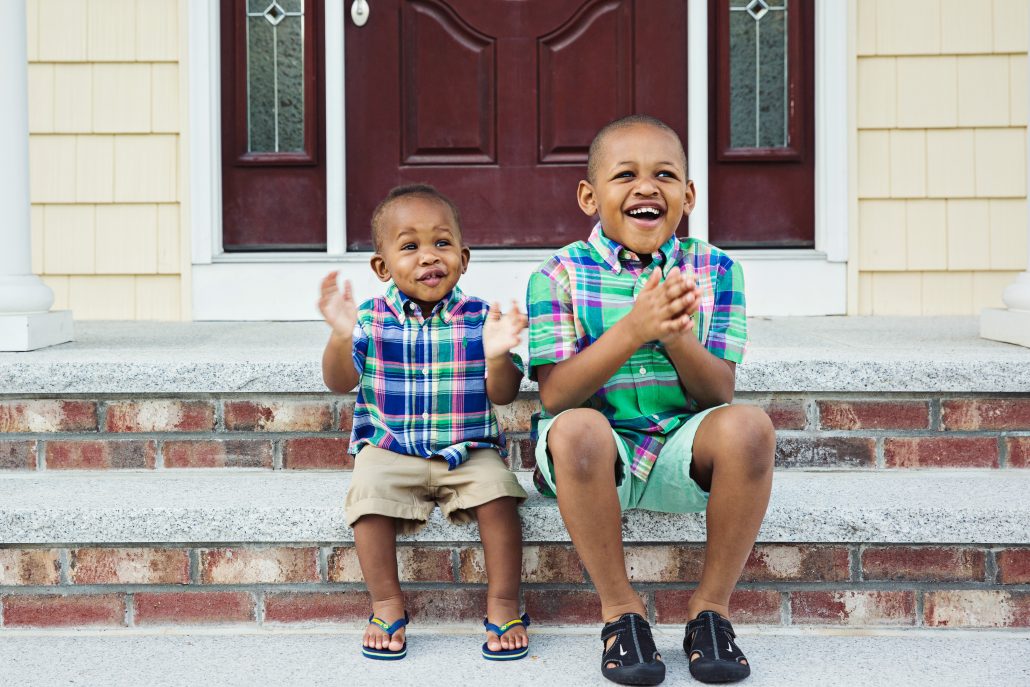 I would love to hear your thoughts on this topic. Please share them in the comment section below and let’s grow together, building a strong community of lifelong learners.
I would love to hear your thoughts on this topic. Please share them in the comment section below and let’s grow together, building a strong community of lifelong learners.
Love,
Chichi






Beautifully written
Awww…thank you so much my dear 😘
Great to start Thanks. 🙂
Thank you so much
Great insight mingled with heartfelt encouragement. Well done sis
Thank you so much. Please share this with someone who might need the encouragement.
You are amazing! I am so honored to have been a part of Ikedi’s educational journey. One of my favorite books is There’s a boy in here by Judy and Sean Barron. It gives the perspective from both the mom and a boy with Autism.
Oh, Wow! Your comment had made my day. Thank you so much. I so appreciate the feedback. Your work with Ikedi and your continued love of him and our family is so invaluable–thanks for helping us along this journey. I will definitely check out that book. Please share this article with folks you think might benefit from it. Thanks again 😘
Very insightful… Thanks for taking the courage to share such a personal journey. God Bless!!
Thank you so much Eva. I truly appreciate the encouragement and support. God bless you.
Chichi 😘
Thank you so much, I needed this TODAY!
You are so so welcome! It warms my heart to know that you found my post helpful–thank you for the invaluable feedback. I wish you all the best 🙂 Sincerely, Chichi